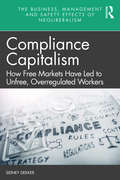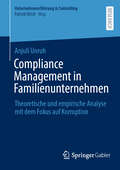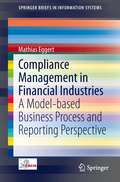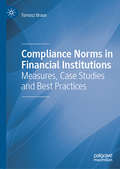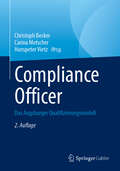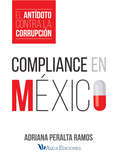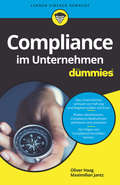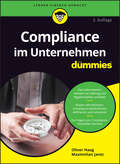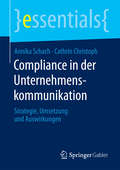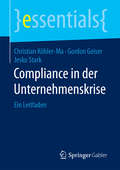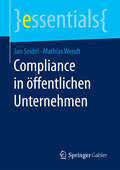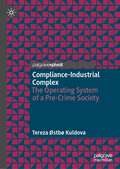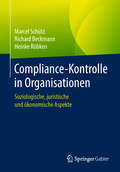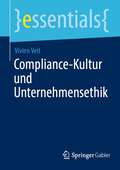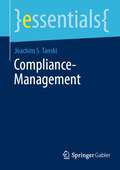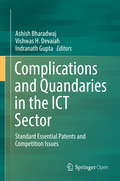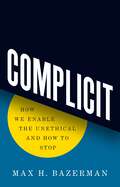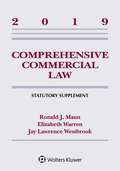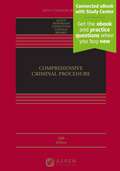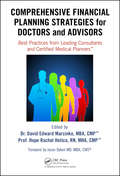- Table View
- List View
Compliance Capitalism: How Free Markets Have Led to Unfree, Overregulated Workers (The Business, Management and Safety Effects of Neoliberalism)
by Sidney DekkerIn this book, Sidney Dekker sets out to identify the market mechanisms that explain how less government paradoxically leads to greater compliance burdens. This book gives shape and substance to a suspicion that has become widespread among workers in almost every industry: we have to follow more rules than ever—and still, things can go spectacularly wrong. Much has been privatized and deregulated, giving us what is sometimes known as ‘new public management,’ driven by neoliberal, market-favoring policies. But, paradoxically, we typically have more rules today, not fewer. It’s not the government: it’s us. This book is the first of a three-part series on the effects of ‘neoliberalism,’ which promotes the role of the private sector in the economy. Compliance Capitalism examines what aspects of the compliance economy, what mechanisms of bureaucratization, are directly linked to us having given free markets a greater reign over our political economy. The book steps through them, picking up the evidence and levers for change along the way. Dekker’s work has always challenged readers to embrace more humane, empowering ways to think about work and its quality and safety. In Compliance Capitalism, Dekker extends his reach once again, writing for all managers, board members, organization leaders, consultants, practitioners, researchers, lecturers, students, and investigators curious to understand the genuine nature of organizational and safety performance.
Compliance Management in Familienunternehmen: Theoretische und empirische Analyse mit dem Fokus auf Korruption (Unternehmensführung & Controlling)
by Anjuli UnruhAnjuli Unruh beleuchtet in diesem Buch die zunehmende Bedeutung von Compliance-Management als Bestandteil einer nachhaltigen Corporate Governance, insbesondere in mittelständischen Familienunternehmen. Sie reagiert auf die wachsende Relevanz von Wirtschaftskriminalität und die damit verbundenen Herausforderungen, die durch regulatorische Anforderungen und öffentliche Erwartungen verschärft werden. Im Mittelpunkt steht das Spannungsfeld zwischen gesetzlichen Vorgaben, individuellen Governance-Strukturen und den soziokulturellen Besonderheiten von Familienunternehmen. Ziel ist die Entwicklung eines konzeptionellen Ansatzes, der die Führungs- und Kontrollstrukturen in mittelständischen Familienunternehmen systematisch abbildet und dabei die Wechselwirkungen zwischen Compliance-Management, Wertschöpfung und Korruption berücksichtigt. Die Analyse liefert praxisnahe Erkenntnisse und evidenzbasierte Handlungsempfehlungen zur Verbesserung des Compliance- und Anti-Korruptionsmanagements. Sie trägt zur Erweiterung der Wissensbasis im Bereich der Unternehmensführung bei und zeigt auf, wie Compliance-Management als Erfolgsfaktor für eine werteorientierte und nachhaltige Unternehmensführung in mittelständischen Familienunternehmen implementiert werden kann.
Compliance Management in Financial Industries: A Model-based Business Process and Reporting Perspective (SpringerBriefs in Information Systems)
by Mathias EggertSince the peak of the world financial crisis in 2008, compliance management has gained more and more interest from practice and research. In particular the financial service industry is strongly regulated and has to follow specific laws, standards and guidelines. Considering the steadily increasing number of legal requirements in the design of information systems is a challenge to financial service providers. This book investigates the challenges of compliance management in financial industries and provides solutions for a compliant design of information models. From a business process perspective, an approach is presented that enables the automatic checking of business process models. From a supervisory reporting perspective a modeling technique is presented that allows for modeling regulatory data warehouse requirements as well as its analysis. Besides these two perspectives the author provides insights into the perceived relationship of Information Systems and Law.
Compliance Norms in Financial Institutions: Measures, Case Studies and Best Practices
by Tomasz BraunInitially, introducing compliance functions within the financial industry had been forced by regulatory scrutiny. Later, it started to spread to other regulated companies, in particular those publicly listed. Now, compliance has become an asset of corporates that want to build their reliability among clients, shareholders, employees and business partners. This book looks at the efficiency of the compliance measures introduced and the best practices of building compliance norms.This recently observed practice of compliance was triggered by the expectation of regulators, shareholders, clients, business partners and the public for robust compliance mechanisms. This book looks at the vast interest in this topic among business people who strive to introduce the systems and the mechanisms of non-compliance risk management in their companies and at the uncountable difficulties and obstacles they meet. The book fills the gap of thorough analysis of this subject by pointing out the solutions successfully introduced in global financial organizations, and would be of interest to academics, researchers and practitioners in corporate finance, corporate governance and risk management.
Compliance Officer: Das Augsburger Qualifizierungsmodell
by Christoph Becker Carina Metscher Hanspeter VietzAufbau, Implementierung und Gelebtwerden einer Compliance-Organisation in Unternehmen erfordern eine ganzheitliche Sichtweise auf das Thema. Ausgehend von juristischen und betriebswirtschaftlichen Fragestellungen beleuchten die Beiträge dieses Bandes die wichtigsten Compliance-Risiken in Unternehmen. Die Autoren diskutieren die Implementierung im Rahmen der Unternehmensorganisation und legen besonderes Augenmerk auf die IT-Strukturen. Die persönlichen Anforderungen an den Compliance-Beauftragten sowie die ethische Verantwortung im Bereich der Compliance bilden einen weiteren Schwerpunkt. Die konsequent praxisorientierte Behandlung des Themas Compliance wird im Kapitel "Praxisfragen der Compliance" mit Themen wie Compliance und M&A, Collective Action, Compliance im Konzern explizit betont.
Compliance Patterns with EU
by Vanja PetričevićThis book provides an in-depth and timely analysis of the member states' compliance patterns with the key European Union Anti-Discrimination Directives. It examines the various structural, administrative, and individual aspects which significantly affect the degree and the nature of compliance patterns in select European Union member states.
Compliance en México: El antídoto contra la corrupción
by Adriana Peralta Ramos¿Cómo generar una cultura laboral sustentada en integridad y ética? El ser humano es ambicioso por naturaleza, consecuentemente desea poseer riqueza y poder, pero esta ambición natural no justifica el uso de medios ilegales ni el abuso del poder o autoridad para obtenerles. Cuando el individuo utiliza medios nocivos para alcanzar sus fines, se convierte en corrupto, en criminal. Evitar que las personas saquen provecho indebido de sus puestos de trabajo y se beneficien de manera ilícita de sus actividades es el tema de este libro. Adriana Peralta hace un análisis profundo del problema y ofrece soluciones reales. COMPLIANCE es un camino probado, es el más corto y la mejor respuesta para crear un comportamiento íntegro y ético en el mundo laboral.
Compliance im Unternehmen für Dummies (Für Dummies)
by Oliver Haag Maximilian JantzErfüllt Ihr Unternehmen die gesetzlichen Vorgaben? Die Rechtsfolgen bei Compliance-Verstößen können erheblich sein. Wer sich also mit Compliance auskennt, die Risiken kennt und zu vermeiden oder zumindest zu begrenzen weiß, der ist gut beraten. Dieses Buch zeigt, mit welchen konkreten Compliance-Maßnahmen Sie Ihr Unternehmen sauber halten und sich wirkungsvoll gegen Compliance-Verstöße wie zum Beispiel Korruption oder andere Regelverstößeschützen können.
Compliance im Unternehmen für Dummies (Für Dummies)
by Oliver Haag Maximilian JantzErfüllt Ihr Unternehmen die gesetzlichen Vorgaben? Die Rechtsfolgen bei Compliance-Verstößen können erheblich sein. Wer sich also mit Compliance auskennt, die Risiken kennt und zu vermeiden oder zumindest zu begrenzen weiß, der ist gut beraten. Dieses Buch zeigt, mit welchen konkreten Compliance-Maßnahmen Sie Ihr Unternehmen sauber halten und sich wirkungsvoll gegen Compliance-Verstöße wie zum Beispiel Korruption oder andere Regelverstößeschützen können.
Compliance in der Unternehmenskommunikation: Strategie, Umsetzung und Auswirkungen (essentials)
by Annika Schach Cathrin ChristophDas Essential bietet eine umfassende Einführung in die Kommunikation von Compliance aus konzeptioneller, redaktioneller und rechtlicher Perspektive. Annika Schach und Cathrin Christoph beschreiben die Maßnahmen der internen und externen Kommunikation, die notwendig sind, um alle relevanten Stakeholder zu erreichen. Darüber hinaus schildern sie die Besonderheiten bei der Verschriftlichung von Verhaltensregeln in Form eines Code of Conduct und gehen auf den Einfluss von Compliance auf die Medien- und PR-Arbeit ein - inklusive Einblick in die Praxis in Form eines Interviews mit einem der Redakteure von Europas größtem Automobilmagazin.
Compliance in der Unternehmenskrise: Ein Leitfaden (essentials)
by Christian Köhler-Ma Gordon Geiser Jesko StarkDieses essential bietet einen umfassenden #65533;berblick #65533;ber die aus Compliancegr#65533;nden zu beachtenden Pflichten der Gesch#65533;ftsleitung in der Krise ihres Unternehmens. Die Autoren geben f#65533;r die typischen Krisenphasen konkrete Handlungsempfehlungen und erl#65533;utern Situationen, die zu einer pers#65533;nlichen Haftung f#65533;hren k#65533;nnen. Schlie#65533;lich wird der Ablauf eines Insolvenzverfahrens erkl#65533;rt und der Leser erf#65533;hrt, welche Auswirkungen dies auf Sanierungschancen und Haftungsthematiken hat. Beachtung finden auch die zahlreichen Fallstricke und Stolpersteine im Zusammenhang mit Unternehmenskrisen, welche unter anderem durch die Vielzahl der widerstreitenden Interessen der verschiedenen Beteiligten entstehen.
Compliance in öffentlichen Unternehmen (essentials)
by Jan Seidel Mathias WendtDas essential beleuchtet die spezifischen Risiken der persönlichen Haftung für öffentliche Unternehmen. Die Autoren lassen ihre Erfahrungen aus der Errichtung und Prüfung von Compliance-Strukturen in Unternehmen der öffentlichen Hand einfließen. Die Entwicklung der Rechtsprechung in jüngerer Zeit hat gezeigt, dass die Risiken der persönlichen Haftung auch für Entscheider in Unternehmen der öffentlichen Hand ein relevantes Berufsrisiko darstellen. Dabei spielt die Organisationsform (öffentlich-rechtlich oder privatrechtlich) keine nennenswerte Rolle.
Compliance-Industrial Complex: The Operating System of a Pre-Crime Society
by Tereza Østbø KuldovaThis is the first book to examine the growth and phenomenon of a securitized and criminalized compliance society which relies increasingly on intelligence-led and predictive technologies to control future risks, crimes, and security threats. It articulates the emergence of a ‘compliance-industrial complex’ that synthesizes regulatory capitalism and surveillance capitalism to impose new regimes of power and control, as well as new forms of subjectivity subservient to the ‘operating system’ of a pre-crime society. Looking at compliance beyond frameworks of business management, corporate governance, law, and accounting, it looks as it as a social phenomenon, instrumental in the pluralization and privatization of policing, where the private intelligence, private security, and big tech companies are being concentrated at the very core of compliance, and hence, governance of the social. The critical book draws on transversal, rather than interdisciplinary, approaches and integrates disparate perspectives, inspired by works in critical criminology, critical algorithm studies, critical management studies, as well as social anthropology and philosophy.
Compliance-Kontrolle in Organisationen: Soziologische, juristische und ökonomische Aspekte
by Marcel Schütz Heinke Röbken Richard BeckmannDas Buch bietet eine systematische und interdisziplinäre Darstellung zur Compliance-Kontrolle in Unternehmen, Verwaltungen und weiteren Einrichtungen. Die Autoren befassen sich mit der Diskussion entsprechender Regelwerke bzw. Konzepte sowie den organisatorischen Folgen. Hierzu entwickeln sie sozial-, rechts- und wirtschaftswissenschaftliche Bezüge einer Analyse und Gestaltung organisatorischer Regelsetzung und -begründung. Besonderes Augenmerk gilt dem Spannungsverhältnis formaler und informaler Ordnung sowie dem Ansatz der „brauchbaren Illegalität“. Das Werk richtet sich an mit Compliance-Aspekten beschäftigte Wissenschaftler sowie Experten und Entscheider in Organisationen aller Art.
Compliance-Kultur und Unternehmensethik (essentials)
by Vivien VeitDieses essential beschäftigt sich mit der Frage, was neben einem fundierten Compliance-Management-System nötig ist, um nachhaltig und belastbar eine Kultur der Regeltreue im Unternehmen zu erreichen. Hierzu werden die derzeitigen regulatorischen Ansätze im In- und Ausland sowie Tools und Bausteine vorgestellt, die eine solche Entwicklung begünstigen. Kombiniert mit zahlreichen Statements und konkreten Beispielen und Erfahrungsberichten von Unternehmensvertretern, Beratern und Behördenvertretern entsteht eine Toolbox für Compliance-Verantwortliche, die die Arbeit an individuellen Lösungen erleichtert und darüber hinaus Inspiration für neue Ansätze im eigenen Unternehmen sein kann.
Compliance-Management (essentials)
by Joachim S. TanskiDieses Buch bietet eine komprimierte und praxisorientierte Einführung in die Grundlagen und Anforderungen eines Compliance-Managements, um den Leser schnell mit aktuellen und zentralen Regelungen vertraut zu machen. Dabei wird auf gesetzliche und regulatorische Bestimmungen ebenso eingegangen wie auf betriebswirtschaftliche Notwendigkeiten, um Mitarbeitende und Unternehmen vor den schwerwiegenden Folgen von Compliance-Verstößen zu schützen.
Complicated Lives: Free Blacks in Virginia, 1619-1865
by Sherri BurrWould the United States have developed differently if Virginia had not passed a law in 1670 proclaiming all subsequently arriving Africans as servants for life, or slaves? Complicated Lives upends the pervasive belief that all Africans landing on the shores of Virginia in late August 1619, and thereafter, became slaves. In reality, many of these kidnap victims received the status of indentured servants. Indeed, hundreds of thousands of free African Americans owned property, created businesses, and engaged in public service. Complicated Lives explores the lives of Free Blacks through the lens of the author's ancestors and other Free Blacks who lived this history, including those who served in the integrated troops commanded by George Washington during the Revolutionary War. "Complicated Lives is a much-needed chronicle of the achievements and plight of Free Blacks in America, and how many of our nation's Founding Fathers and notables struggled with the dichotomy of slavery and freedom. This is a scholarly work that belongs on the shelves of all worthy historians, but also reads like a novel, making it approachable to the lay reader." --FRANK ALAN BURR, author of McKinley Memories--A Memoir
Complications and Quandaries in the ICT Sector: Standard Essential Patents and Competition Issues
by Indranath Gupta Ashish Bharadwaj Vishwas H. DevaiahThis book is open access under a CC BY 4. 0 license. With technology standards becoming increasingly common, particularly in the information and communications technology (ICT) sector, the complexities and contradictions at the interface of intellectual property law and competition law have emerged strongly. This book talks about how the regulatory agencies and courts in the United States, European Union and India are dealing with the rising allegations of anti-competitive behaviour by standard essential patent (SEP) holders. It also discusses the role of standards setting organizations / standards developing organizations (SSO/SDO) and the various players involved in implementing the standards that influence practices and internal dynamics in the ICT sector. This book includes discussions on fair, reasonable and non-discriminatory (FRAND) licensing terms and the complexities that arise when both licensors and licensees of SEPs differ on what they mean by " fair", "reasonable" and "non-discriminatory" terms. It also addresses topics such as the appropriate royalty base, calculation of FRAND rates and concerns related to FRAND commitments and the role of Federal Trade Commission (FTC) in collaborative standard setting process. This book provides a wide range of valuable information and is a useful tool for graduate students, academics and researchers.
Complications in Neurosurgery II (Acta Neurochirurgica Supplement #133)
by Keki Turel Ekkehard M. KasperThis Open Access book on Complications in Neurosurgery contains the proceedings of the 2nd ICCN conference held in Mumbai in 2019. The work illustrates and discusses key point of intra- and postoperative complications encountered in brain, spine and peripheral nerve surgery. In addition, this compilation addresses topics in ethics, with further contributions covering medico legal and didactic aspects. It draws from the experience of an international team of experts from all subspecialties in neurosurgery, including oncology, vascular, spine, pediatrics and others. The articles were written by renown specialists in the field who are stepping forward to share their valuable professional experience with colleagues following their joint mission to improve future patient care.
Complicit: How We Enable the Unethical and How to Stop
by Max H. BazermanWhat all of us can do to fight the pervasive human tendency to enable wrongdoing in the workplace, politics, and beyondIt is easy to condemn obvious wrongdoers such as Elizabeth Holmes, Harvey Weinstein, and the Sackler family. But we rarely think about the many people who supported their unethical or criminal behavior. In each case there was a supporting cast of complicitors: business partners, employees, investors, news organizations, and others. And, whether we’re aware of it or not, almost all of us have been complicit in the unethical behavior of others. In Complicit, Harvard Business School professor Max Bazerman confronts our complicity head-on and offers strategies for recognizing and avoiding the psychological and other traps that lead us to ignore, condone, or actively support wrongdoing in our businesses, organizations, communities, politics, and more.Complicit tells compelling stories of those who enabled the Theranos and WeWork scandals, the opioid crisis, the sexual abuse that led to the #MeToo movement, and the January 6th U.S. Capitol attack. The book describes seven different behavioral profiles that can lead to complicity in wrongdoing, ranging from true partners to those who unknowingly benefit from systemic privilege, including white privilege, and it tells the story of Bazerman’s own brushes with complicity. Complicit also offers concrete and detailed solutions, describing how individuals, leaders, and organizations can more effectively prevent complicity.By challenging the notion that a few bad apples are responsible for society’s ills, Complicit implicates us all—and offers a path to creating a more ethical world.
Complicity and the Law of State Responsibility
by Helmut Philipp AustThis systematic analysis of State complicity in international law focuses on the rules of State responsibility. Combining a theoretical perspective on complicity based on the concept of the international rule of law with a thorough analysis of international practice, Helmut Philipp Aust establishes what forms of support for wrongful conduct entail responsibility of complicit States and sheds light on the consequences of complicity in terms of reparation and implementation. Furthermore, he highlights how international law provides for varying degrees of responsibility in cases of complicity, depending on whether peremptory norms have been violated or special subject areas such as the law of collective security are involved. The book shows that the concept of State complicity is firmly grounded in international law, and that the international rule of law may serve as a conceptual paradigm for today's international legal order.
Composting and Recycling Municipal Solid Waste (CRC Press Revivals)
by Luis F. Diaz Clarence G. Golueke George M. Savage Linda L. EggerthComposting and Recycling Municipal Solid Waste is a comprehensive guide that identifies, describes, explains, and evaluates the options available when composting and recycling municipal solid waste (MSW). The book begins with an introductory chapter on the nature of MSW and the importance of solid waste management programs and resource recovery. Chapter 2 discusses MSW storage and collection, with emphasis on recyclables. Chapter 3 examines issues involved in determining the quantity, composition, and key physical characteristics of the MSW to be managed and processed. The book's other chapters cover topics such as the steps required for processing MSW for material recovery, the use of uncomposted organic matter as a soil amendment, composting and use of compost product, the marketing of recyclables, biogasification, and integrated waste management. Composting and Recycling Municipal Solid Waste provides essential information needed by solid waste professionals, consultants, regulators, and planners to arrive at rational decisions regarding available economic and technological resources for MSW composting and recycling.
Comprehensive Commercial Law: 2019 Statutory Supplement (Supplements)
by Elizabeth Warren Ronald J. Mann Jay WestbrookThe Supplement includes the entire Uniform Commercial Code as of May 2019, excluding Article 6, and a selection of other federal statutes and regulations, uniform state laws, and Restatement provisions, aiming to include those items most commonly used in commercial law courses: the Truth in Lending Act, the Electronic Funds Transfer Act, the Federal Tax Lien Act, the Uniform Electronic Transactions Act, excerpts from the CISG, and excerpts from the ICC’s uniform rules for letters of credit. The Bankruptcy Code, as of June 1, 2019, is reproduced in full. Unlike the UCC, there are no official comments for the Bankruptcy Code, and the legislative history is spotty at best. As a result, only the Code is offered here. In addition, selections from Title 18 and Title 28 of the United States Code that are relevant to bankruptcy law are included.
Comprehensive Criminal Procedure (Aspen Casebook)
by Joseph L. Hoffmann Debra A. Livingston Andrew D. Leipold Tracey L. Meares Ronald Jay AllenComprehensive Criminal Procedure, Fifth Edition is perfect for all introductory courses in criminal procedure law (including both investigation and adjudication courses, as well as comprehensive and survey courses). The casebook focuses primarily on constitutional criminal procedure law, but also covers relevant statutes and court rules. The casebook is deliberately challenging--it is designed for teachers who want to explore deeply not only the contemporary state of the law, but also its historical and theoretical foundations. The casebook incorporates a particular emphasis on empirical knowledge about the real-world impacts of law-in-action; the significance of race and class; the close relationship between criminal procedure law and substantive criminal law; the cold reality that hard choices sometimes must be made in a world of limited criminal justice resources; and, finally, the recognition that criminal procedure law always should strive to achieve both fairness to the accused and justice for society as a whole.
Comprehensive Financial Planning Strategies for Doctors and Advisors: Best Practices from Leading Consultants and Certified Medical Planners
by David Edward Marcinko Hope Rachel HeticoDrawing on the expertise of multi-degreed doctors, and multi-certified financial advisors, Comprehensive Financial Planning Strategies for Doctors and Advisors: Best Practices from Leading Consultants and Certified Medical Planners will shape the industry landscape for the next generation as the current ecosystem strives to keep pace.Traditional g
